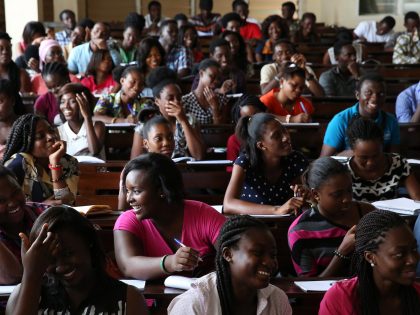
Participation without competition
Yoruba political ontology, non-competitive democracy, and the sacrality of power in Nigeria.

Yoruba political ontology, non-competitive democracy, and the sacrality of power in Nigeria.

The award-winning South African author Melinda Ferguson takes us through a selection of books exploring freedom, death, truth, as well as psychedelics, which can be a route to pondering such big questions.

We need to stop looking to Euro-America and its models and traditions, especially religion, as the source of all answers to the problems of the African continent and its people.

The author writes about books whose true power comes from excavating the perennial endemic diseases that never leave our sight.

Existing models of racial healing center whiteness and demand the emotional labor of Black folk, fetishizing reconciliation but forsaking justice.

On the last episode of our sports and music series on Africa Is a Country Radio, we visit with Sean Jacobs and Tony Karon of the Eleven Named People podcast to preview the 2022 men's World Cup football tournament.

For philosophy to be relevant in Africa, it must democratize and address contemporary social problems.

In a US confronting its own anti-black racism, sentimental imaginings of Africa do little but uphold the white savior industrial complex.

Many see Salafism as rigid and unbending, but in the Sahel, political conditions force its proponents to be smart and savvy.

We are usually more attuned to Africa’s pains than to Africa’s pleasures. What would studying African pleasures, beyond censorious judgment, look like?

In the third installment on Afrobeat in South America, political scientist Simon A. Akindes writes about Newen Afrobeat from Chile’s capital.

Amil Shivji’s latest film, 'Vuta N’Kuvute,' is a gift, not only to the people of Tanzania, Zanzibar and its diasporas, but to the world.

On the occasion of the release of 'How to Write About Africa,' a collection of early essays and short fiction by Binyavanga Wainaina, Achal Prabhala remembers his friend’s earlier beginnings and literary breakthroughs.

NoViolet Bulawayo’s novel 'Glory' forcefully evokes the Zimbabwean political landscape but struggles to stretch itself beyond the documentarian, vacillating between the journalistic and fictive.

Jacques Bongoma was a young Congolese progressive who became a close advisor to Joseph Mobutu after the country’s 1965 coup.

The author’s new book wants to clear away some of the misunderstandings that dog Africa and China relations. Here, he catalogs the books that guided him.

The age of the podcasters as thought leaders—think #PodcastandChill and The Hustlers Corner—is upon us.

The books that the author, a Cameroonian novelist, has been reading share an ethics of political engagement, a quest for identity and cultural inventory, and an ear for the voices and harmonies of African languages.

In the second of five articles on Afrobeat music in South America, political scientist Simon Akindes writes about the all women and nonbinary Brazilian band, Funmilayo Afrobeat Orquestra.

A new exhibit of Jean-Michel Basquiat's life and work explores the influences of his family and the African world on his visual sensibilities and identity.